

Technology in the Legal Profession: ChatGPT's Use Cases and Challenges






The legal profession is rapidly evolving as technology transforms traditional workflows. In 2025, ChatGPT and similar AI models are redefining how lawyers conduct research, draft contracts, manage documents, and interact with clients.
According to the 2025 ABA Legal Technology Survey, AI adoption in law firms increased from 11% in 2023 to 30% in 2025, a clear sign of accelerating digital transformation.
Key trends include hyperautomation of repetitive legal tasks, predictive analytics for case outcomes, integration of generative AI into legal software, and a stronger emphasis on AI governance and ethics. While these innovations drive efficiency and accessibility, they also introduce challenges around accuracy, data privacy, and regulatory compliance.
This blog explores ChatGPT’s growing role in the legal industry its most impactful use cases, emerging opportunities, and the critical challenges shaping the future of AI-powered legal practice.
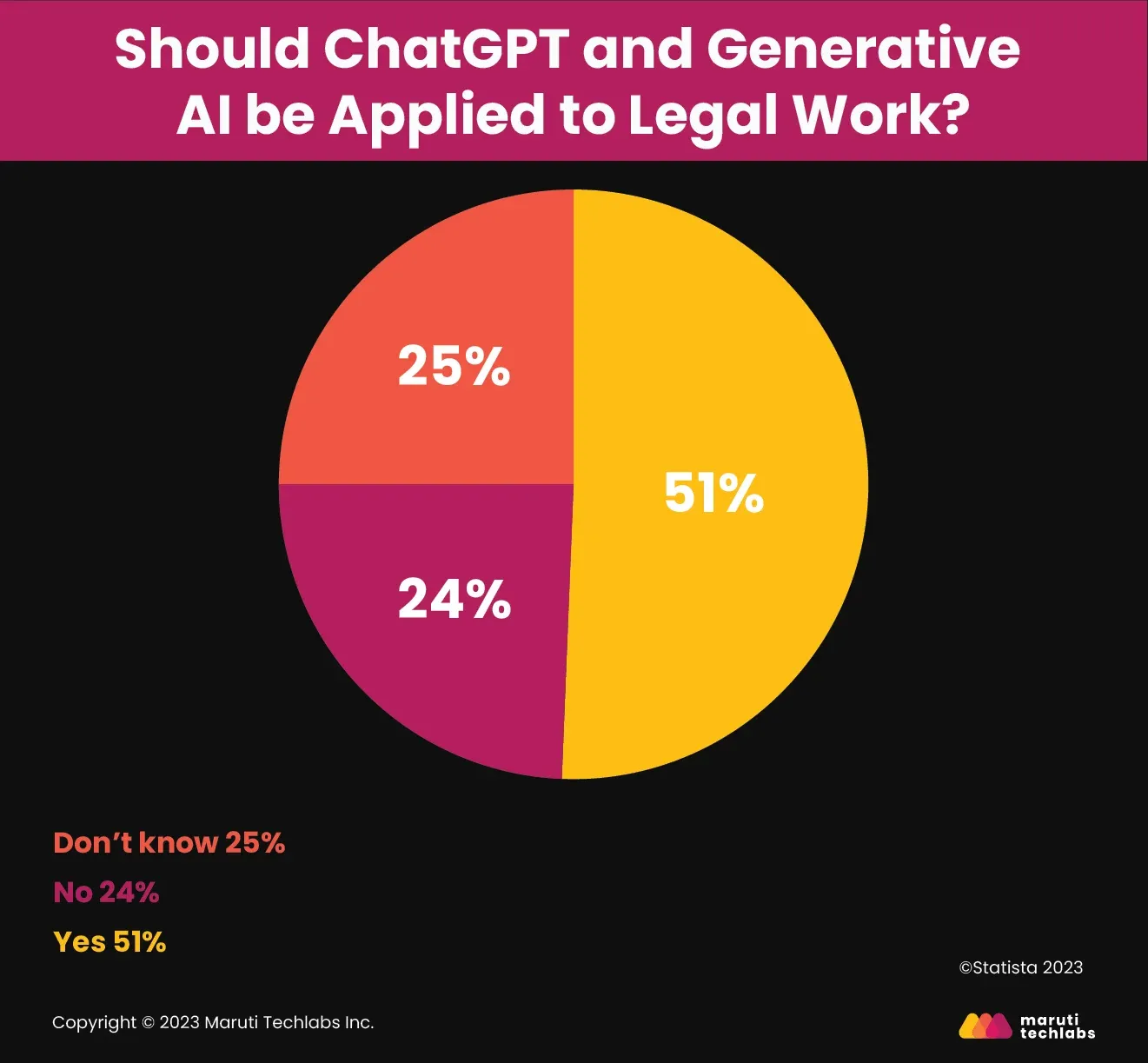
A dream for attorneys is to have a virtual assistant that does everything from summarizing documents to simulating client interactions. ChatGPT for lawyers does all that and more by introducing a radical shift with automation and convenience to the daily challenges law firms incur.
Steve Hasker, CEO and President of Thomson Reuters highlights AI's profound transformative capabilities, stating, “Through the application of AI to perform more mundane tasks, professionals have the unique opportunity to address human capital issues such as job satisfaction, well-being, and work-life balance. This will in turn, unlock time for professionals to focus on complex work that adds value to their client’s needs.”
As we explore the dynamic relationship between law and artificial intelligence, the shift towards automation streamlines processes and offers a gateway for legal professionals to redefine their roles.
So whether you’re an experienced law professional, a law student wanting to glimpse the future, or a curious individual wanting to learn where law and AI intersect, this blog presents all the essentials to unveil the numerous possibilities ChatGPT introduces to the legal sphere.
ChatGPT, a form of generative AI, is an advanced language model that understands and generates human-like text. For lawyers, it assists in drafting documents, summarizing cases, answering legal queries, and enhancing client communication.
Unlike traditional legal research tools that rely on predefined databases and keyword searches, ChatGPT interprets natural language contextually, generating coherent explanations and insights beyond static retrieval.
Compared to specialized legal AI focused on narrow tasks like e-discovery or contract review, ChatGPT offers broader adaptability, supporting reasoning, ideation, and workflow automation across multiple legal functions, while still requiring human oversight for accuracy and ethical compliance.
Let’s explore this
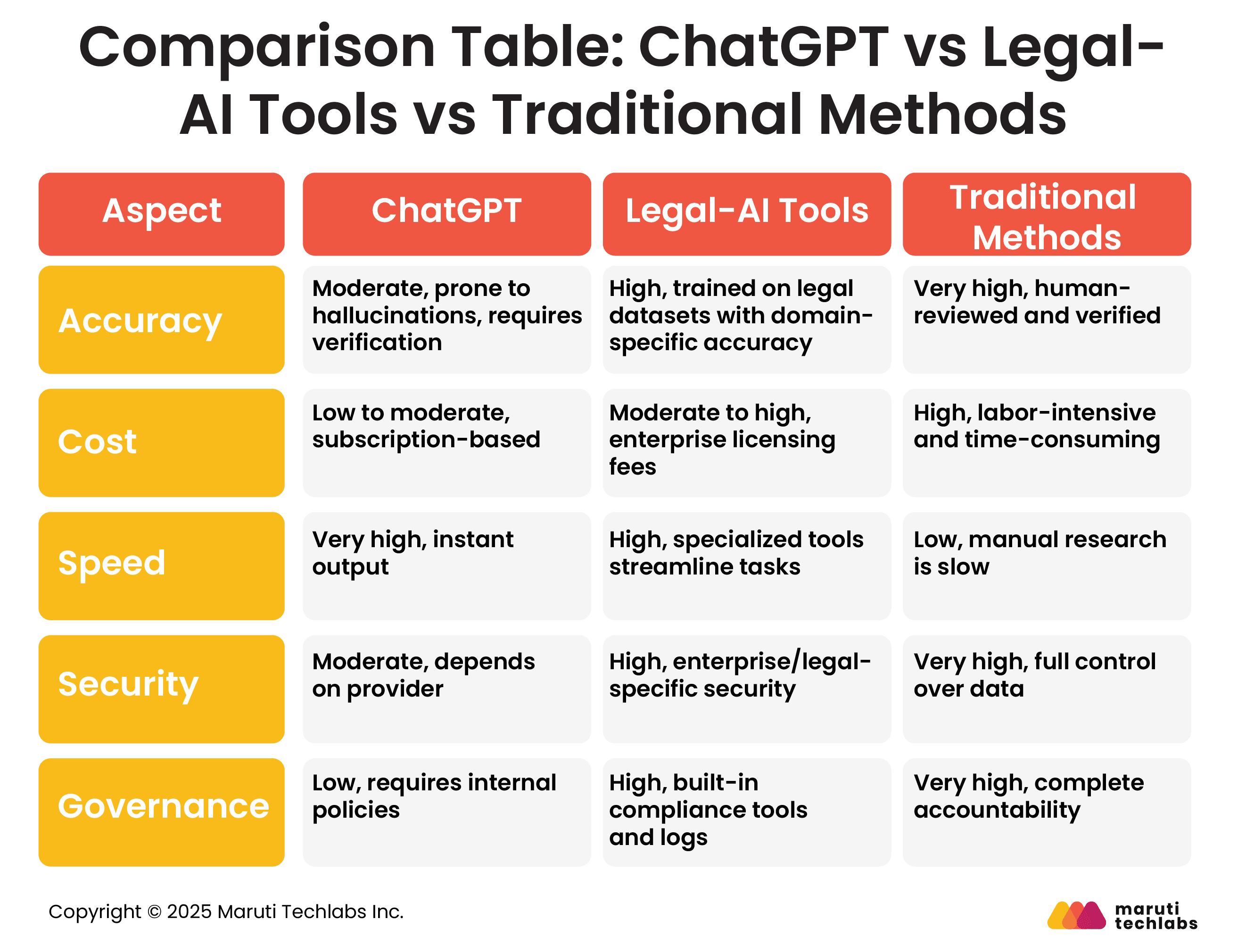
ChatGPT has demonstrated both promise and pitfalls in legal practice.
However, not all uses have gone smoothly.
These incidents highlight both the transformative potential and serious risks of generative AI in law, underscoring the need for verification, transparency, and responsible adoption within legal workflows.
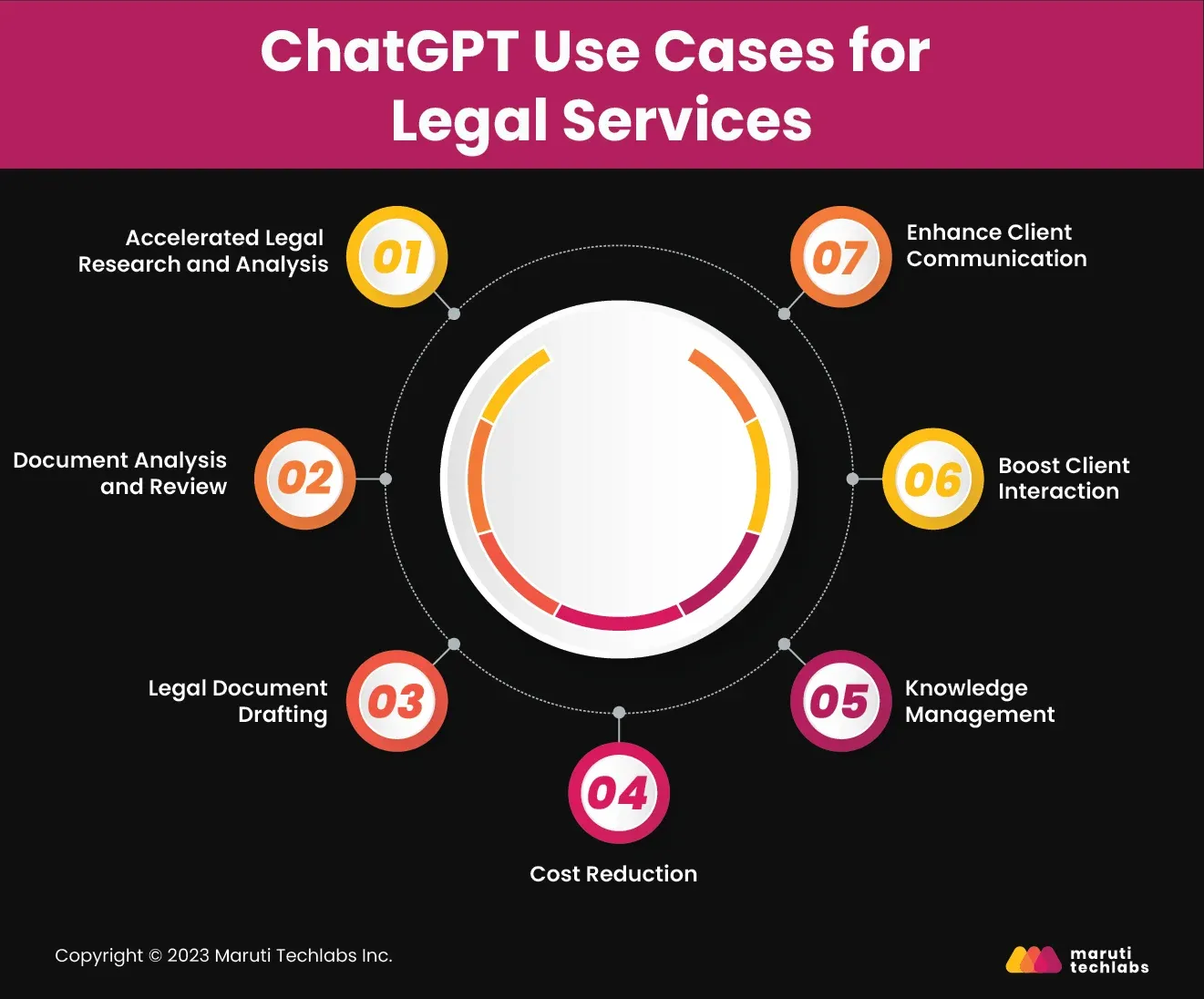
Powerful language-model-based chatbots such as ChatGPT enable lawyers to automate tedious tasks. Lawyers can utilize their valuable time with other essential duties rather than spending it on legal research analysis and writing contracts and briefs. Here’s a list of a few evident use cases that generative chatbots such as GPT offer to lawyers.
Legal tech solutions like ChatGPT can significantly expedite several vertices of the research and analysis process.
In the case of research, ChatGPT can quickly skim through numerous legal databases and repositories, swiftly extracting scholarly articles, regulations, specific case laws, and more, presenting lawyers with summaries and appropriate citations.
ChatGPT's capabilities extend to delving into intricate case details and facts, offering legal professionals insightful strategies and arguments. It can also assist with skillfully assessing potential risks, summarizing the analysis, and generating opinions or memoranda.
A unique feature of ChatGPT for lawyers is its ability to monitor updates, news, and regulatory changes consistently. It can keep regular tabs on updates, news, and changes in regulations, keeping lawyers informed of the upgrades in the legal landscape and ensuring they stay up-to-date in their field.
Below are domains where ChatGPT for lawyers can be utilized for document analysis and review.
ChatGPT is proficient in browsing vast legal documents such as contracts, legal opinions, and statuses. It helps in determining vital information and critical clauses.
It can also summarize detailed documents, retrieve particulars, and point out distinct areas related to a particular case or query. It offers lawyers actionable and condensed insights to act on.
Zach Warren, Content lead for Technology and Innovation of Thomson Reuters Institute, says, “Generative AI is smart enough to give a plausible answer to most prompts,”. “From there, the human using the tool should decide whether the material is accurate and edits. It can be a great way to get a solid first draft, even for legal issues”, he adds.
ChatGPT can easily compare multiple documents, stating differences, similarities, and discrepancies. This feature is handy when reviewing contracts or inspecting changes across different versions of legal documents.
It helps recognize potential areas of concern or inconsistencies that might present legal challenges by assessing risks within contracts or legal documents. This is critical when conducting mergers, investigations, or acquisitions due diligence.
ChatGPT is exquisite when drafting legal documents. Here are some key areas where it can be helpful.
Depending on the type of document you want to create, whether an agreement or contract, it can offer templates and suggestions related to the tone of your language. It also provides convenience by pre-defining the typical sections and covering the basics.
Following the legal standards, ChatGPT ensures accuracy with legal language and terminologies while giving an apt structure to sentences and paragraphs. Furthermore, it expedites the proofreading process, promoting and assuring consistency and flagging omissions or errors.
Here are three ways ChatGPT for lawyers contributes to cost reduction for law firms.
ChatGPT saves a great deal of time for lawyers by introducing automation to tasks such as drafting, legal research and analysis, and reviewing documents. It fosters increased attention to high-value tasks while decreasing billable hours on repetitive tasks.
The need to review each line with legal documents or contracts is remarkably minimized using ChatGPT for lawyers. It saves ample time while reducing the possibility of errors and oversight.
It helps lawyers take more on their plate or focus on complex legal issues by handling everyday tasks, ultimately contributing to overall productivity without hiring additional staff.
ChatGPT can be a valuable tool for knowledge management and providing general legal information in several ways.
It can impart information on legal concepts, definitions, processes, and other general legal inquiries.
It aids legal research and references by garnering current precedents and case law based on specific queries.
ChatGPT offers great assistance by designing training modules and collecting material to train law students and educate lawyers.
It helps access legal information, case studies, and FAQs for legal professionals by creating structured internal databases or knowledge repositories.
ChatGPT can boost client interaction by many folds. Here are some of the evident applications of this tech.
Having a chatbot such as GPT adds to a lawyer’s or law firm’s accessibility and responsiveness, as clients can seek information anytime.
ChatGPT offers instant responses to client queries or concerns without waiting for business hours.
Chatbots can free up human resources for complex tasks by handling routine queries and offering essential information such as procedural details, fees, office hours, services, etc.
ChatGPT can help seek timely follow-ups with clients regarding appointments, necessary documents, and ongoing cases, fostering engagement and keeping clients up-to-date throughout the legal process.
ChatGPT can enhance client communication in several ways. Below are some of the most common ways it helps.
ChatGPT can offer tailored responses, learning the client’s needs or preferences and previous interactions and creating a personalized and engaging conversational experience.
It ensures transparency and engagement throughout the legal process by sharing updates and notifying them about court dates, deadlines, and other legal prerequisites.
It can streamline client onboarding by communicating, collecting necessary information, and guiding them through required documentation.
ChatGPT can foster inclusive communication with its language translation feature if your client base possesses a different linguistic background.
Here are the best practices and strategies that one can leverage to implement generative AI efficiently.
Establish mandatory human-in-the-loop reviews for all AI-generated drafts or research. Lawyers should cross-check information with authoritative sources like
LexisNexis, Westlaw, or official court databases to ensure factual and legal accuracy. Verification workflows reduce risks of hallucinations, ensuring outputs meet ethical and professional standards before submission or client communication.
Adopt enterprise-grade or legal-specific AI tools offering enhanced data privacy, encryption, and access control. These platforms are designed to comply with legal confidentiality requirements and jurisdictional standards, minimizing data leakage or misuse.
Implement regular security audits and vendor assessments to maintain compliance with evolving privacy and professional conduct regulations.
Create clear internal policies defining acceptable AI usage, data input limitations, and disclosure requirements. Establish review checkpoints and auditing procedures for AI-generated outputs.
Such governance frameworks enhance accountability, reduce ethical breaches, and ensure lawyers remain responsible for the accuracy, integrity, and client confidentiality of all AI-assisted legal work.
Maintain awareness of AI-related legal and ethical guidelines in relevant jurisdictions. Continuously update tools to align with new data protection and professional conduct standards.
Combine generative AI with traditional legal databases and research tools for balanced, compliant results that strengthen decision-making while safeguarding professional responsibility and client trust.
Though ChatGPT presents certain challenges for lawyers, there are also several tangible benefits. Here is a list of 3 of the most observed benefits.
Solicitors are burdened with managing large amounts of data daily. It includes reports, contracts, legal documents, and case files. This process can be prolonged and error-prone. Here, tools such as ChatGPT for lawyers act like knights in shining armor. It allows them to quickly conclude tasks such as conducting due diligence, drafting contracts, and reviewing documents, sparing them more time to concentrate on other intricate aspects of their cases.
ChatGPT for lawyers can automate daily tasks, conduct legal analysis and research, offer 24/7 availability to clients, train junior lawyers and support staff, and more. It frees up a lot of time for lawyers to concentrate on other important tasks or take on more cases to work on, which ultimately translates into improving cost-effectiveness.
ChatGPT exponentially increases the accessibility of legal information both for clients and lawyers. Its benefits, such as instant information retrieval, language simplification, on-demand assistance, skill enhancement, client interaction and education, and more, enhance the availability of legal services.
As per a Thomson Reuters Future of Professionals Report, ”Generative AI will have a transformational impact on the work professionals do and how it is done, but it will never replace the human element when advising clients and stakeholders.”
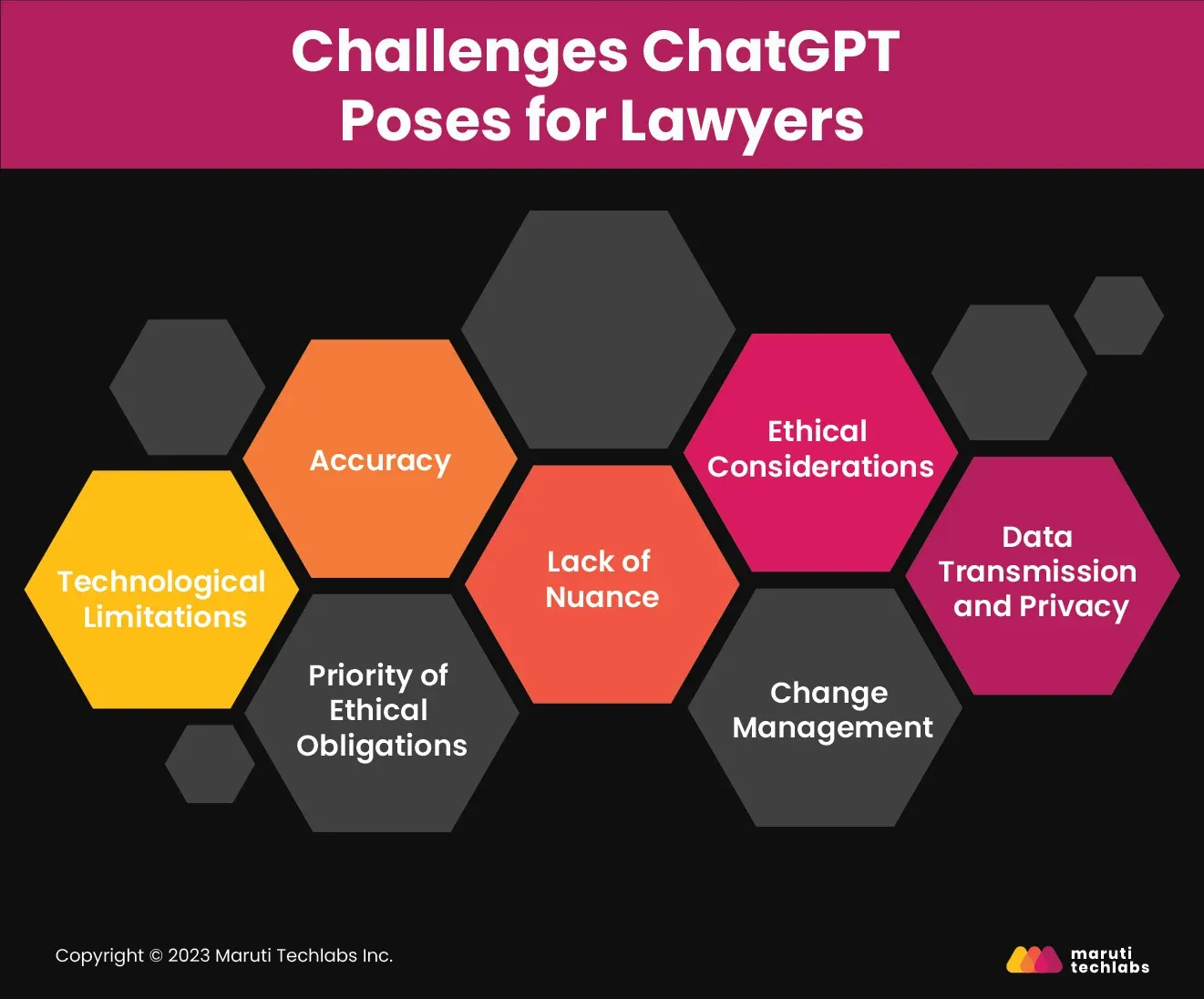
There are many hurdles that ChatGPT poses in the legal sphere. Here is a list of the most prominent challenges observed for legal firms.
ChatGPT poses technical challenges, such as using electronic devices in the courtroom. It also has limited internet access, so its knowledge is confined to events up to 2021. Furthermore, it can fabricate facts and misquote case law without appropriate citations, demanding rigorous verification.
Many users have also reported receiving inaccurate information from the chatbot in training. It can lead to erroneous legal advice, resulting in malpractice and compromised legal outcomes.
ChatGPT falls short of grasping complex legal scenarios, leading to potential misapplication of law and the need for human intervention for nuanced legal analysis.
Ethical considerations are a significant point of discussion when using AI to resolve client concerns. Feeding facts and private information to ChatGPT does not guarantee the confidentiality of client information. Additionally, communication with these servers occurs over the internet with secure connections and protocols, data security is still a prevailing issue when using ChatGPT.
Due to the potential disclosure of client information, data transmission and privacy are challenges for lawyers using ChatGPT. The transfer of information to ChatGPT servers may risk data breaches. It necessitates strict measures to ensure compliance with legal standards.
Lawyers using ChatGPT have to prioritize placing ethical obligations. Their primary challenge is balancing efficient service delivery while adhering to ethical responsibilities. It includes introducing measures for implementing AI and safeguarding client interests.
Following traditional practices may be a barrier for legal professionals due to skepticism, fear of job loss, or reluctance to adapt to new technologies. Overcoming these barriers needs comprehensive education, educating employees on AI benefits with efficiency and client service without compromising legal standards.
The concerns legal professionals voiced in a recent Thomson Reuters survey align with the above challenges. Working professionals were asked about their most significant fears concerning AI in their profession, and it was found that their biggest fears have to do with compromised accuracy, with one-quarter (25%) of respondents citing this as their biggest fear; widespread job loss (19%); the demise of the profession altogether (17%); concerns around data security (15%); and a loss of ethics (15%).
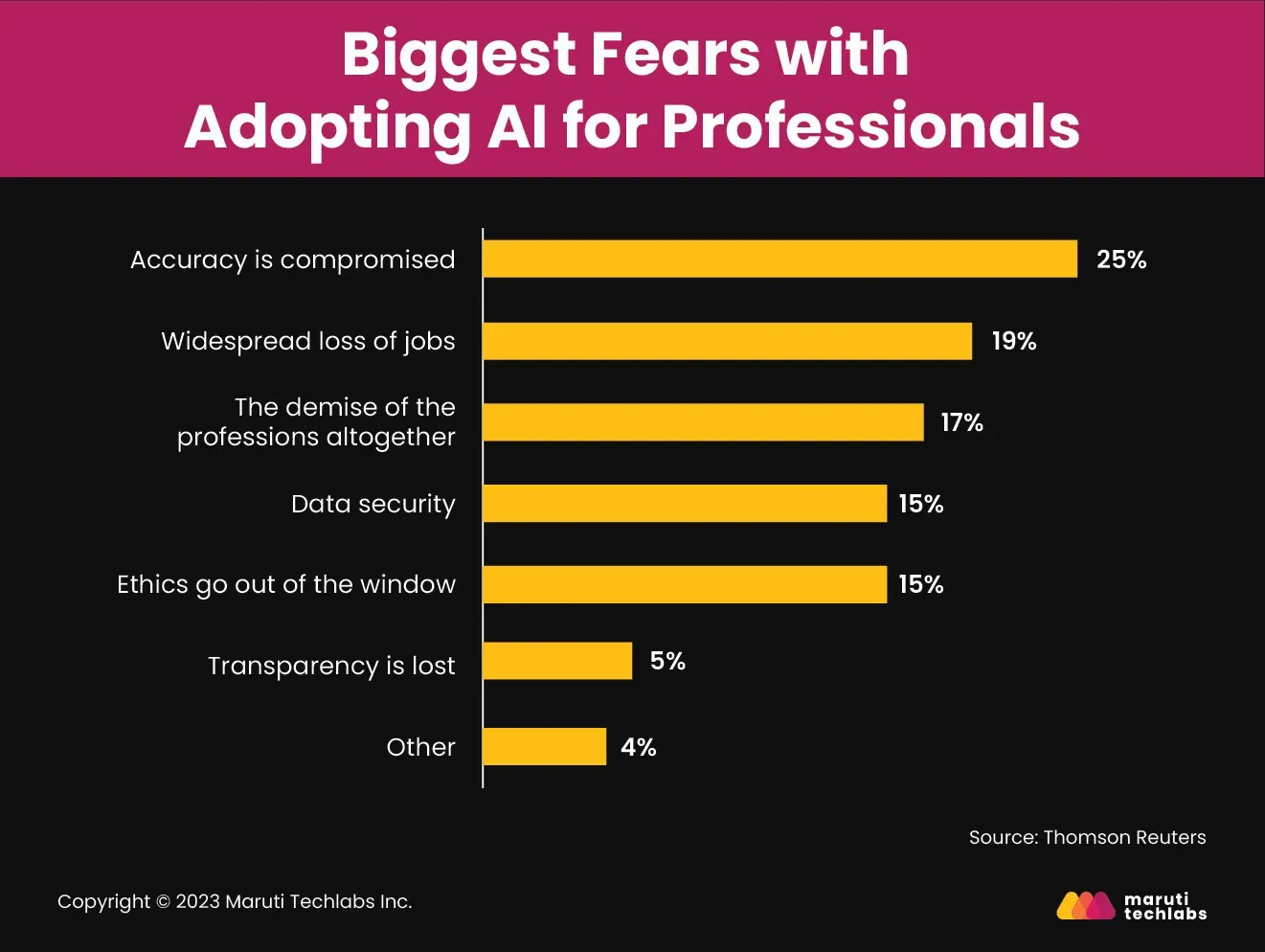
Irrespective of the industry, incorporating AI without any prior knowledge and experience can be a challenging feat to achieve. When employing this tech, one must know how to navigate challenges and solutions while implementing AI.
Effective prompting is key to maximizing ChatGPT’s value for legal work. Clear, precise prompts help ensure outputs are relevant, accurate, and ethically sound, reducing errors and improving efficiency.
This approach ensures ChatGPT delivers precise, useful, and legally safe responses.
Here are some future trends to keep in mind that would enhance AI’s contribution in the legal space.
Large language models (LLMs) are evolving rapidly, with improvements in understanding context, reasoning, and domain-specific language. Fine-tuning these models for legal applications enables greater accuracy, reduces hallucinations, and increases trustworthiness. Advances like retrieval-augmented generation (RAG) and continual learning ensure models stay updated with changing laws, helping lawyers produce reliable outputs faster while maintaining compliance with evolving legal standards.
Future legal AI tools will increasingly integrate with authoritative legal databases, such as LexisNexis, Westlaw, and PACER, allowing real-time citation verification and case law updates. This integration reduces risk of fabricated or outdated references. By combining generative AI’s flexibility with trusted legal repositories, lawyers can streamline research, maintain citation accuracy, and ensure compliance, while improving efficiency and confidence in outputs.
Multi-agent AI systems will enable specialized agents to work together on complex legal tasks, such as contract analysis, case prediction, and compliance checks. These agents can simulate collaborative workflows, distribute workloads, and cross-verify outputs. This approach boosts efficiency, reduces error rates, and allows lawyers to delegate routine tasks to AI while focusing on high-value strategic and interpretative work.
Generative AI significantly impacts legal practitioners' internal operations and external procedures. Its notable areas of contribution to the legal sphere include quick legal research, document analysis, review, and drafting, cost optimization, information governance, enhancing client engagement, and communication. Moreover, it increases efficiency and democratizes everyone's access to legal expertise.
ChatGPT serves as a prime example of AI's potential, showcasing how it can aid law firms and clients in acquiring, generating, and utilizing legal information to enhance the legal system. While predicting the evolution of chatbots like GPT-3 is challenging due to ongoing advancements, it's clear that they will continue to improve in intelligence, benefitting users across various tasks.
For lawyers skeptical about using legal AI tools like ChatGPT, it's important to note that AI is not here to replace them but to augment their capabilities. Leveraging tools like ChatGPT provides a supportive safety net, enhancing rather than threatening their work. This integration allows legal professionals to streamline processes and focus on higher-level tasks requiring human judgment and expertise.
Maruti Techlabs is an expert in designing tailor-made AI-powered solutions to transform your legal practices. Discover how our cutting-edge AI services can streamline operations, enhance client experiences, and revolutionize your firm’s efficiency. Let’s venture into an irreversible journey to upgrade your legal services with innovative AI.
Lawyers must exercise caution. ChatGPT can assist in drafting or research but cannot replace professional legal judgment. Providing AI-generated advice without verification may breach ethical rules.
Lawyers should ensure outputs are reviewed, accurate, and tailored to client circumstances, keeping responsibility and accountability in human hands.
Using ChatGPT in court filings carries risks such as fabricated citations, inaccuracies, and incomplete reasoning. Courts may sanction submissions containing incorrect or unverifiable content.
To mitigate risk, lawyers must verify all outputs, maintain audit trails, and clearly disclose when AI tools were used, ensuring compliance with procedural and ethical rules.
Verification involves cross-checking AI-generated content with authoritative legal databases (LexisNexis, Westlaw, official statutes), applying human legal judgment, and confirming citations.
Use structured review workflows, involve senior counsel for oversight, and document verification steps to ensure compliance, reduce risk, and maintain professional and ethical standards.
Client confidentiality depends on the AI platform’s data policies. Standard ChatGPT lacks built-in legal confidentiality safeguards. Lawyers should use enterprise or legal-specific AI tools with encryption, access controls, and compliance certifications.
Internal policies must restrict sensitive input and ensure confidentiality under professional conduct rules.
AI use in legal research varies by jurisdiction. The U.S., U.K., and Australia generally permit AI use with caution, emphasizing verification and disclosure. Some jurisdictions impose restrictions or ethical guidelines.
Others lack clear regulation. Lawyers must monitor evolving rules, adhere to local bar requirements, and ensure AI use complies with jurisdiction-specific ethical and legal standards.


